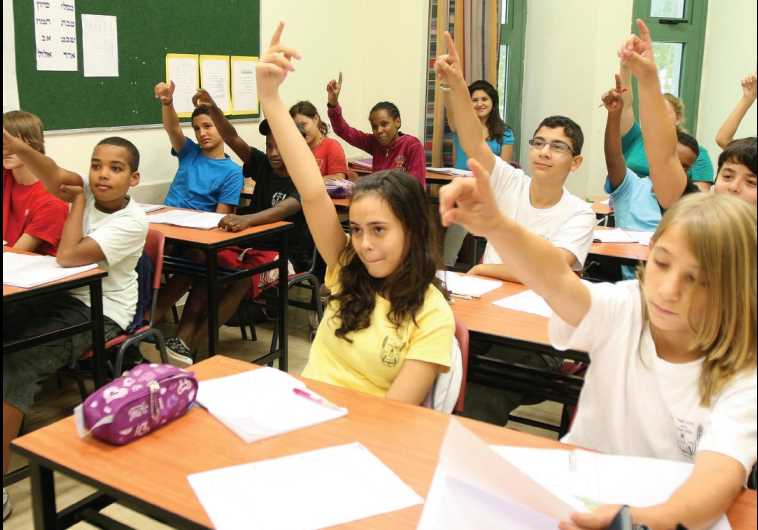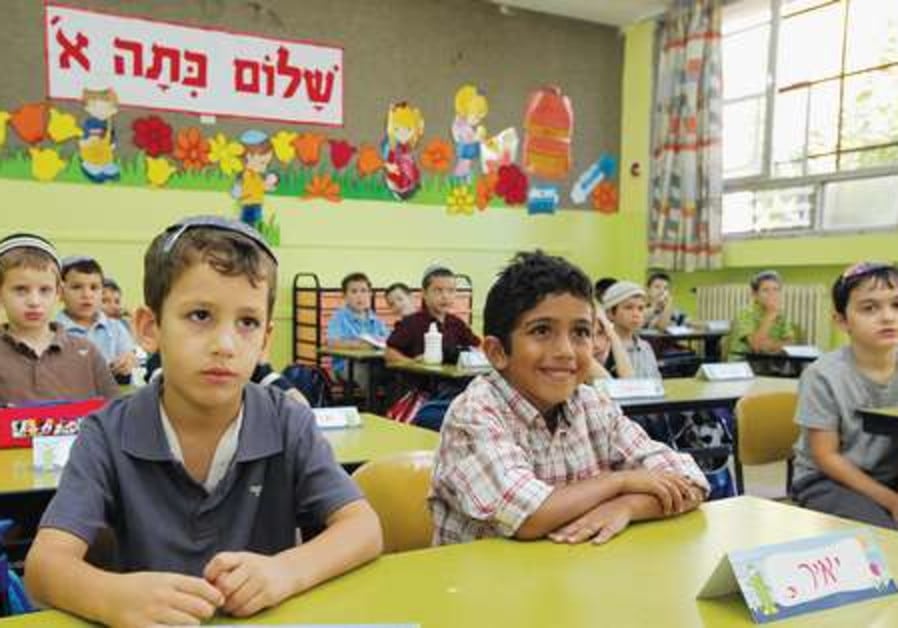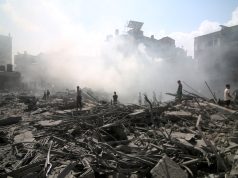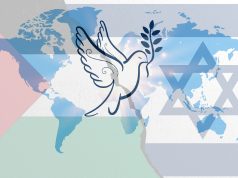In an exclusive interview, Eytan Meir, the director of external relations at Im Tirtzu, stated that New Israel Funded groups are running 14 programs in 350 Israeli schools: “One of them is ACRI, which is the New Israel Fund flag grantee that is running a program on ‘human rights education.’ They file Supreme Court petitions on behalf of terrorists and petition against the IDF. Another one is ‘dialogue meetings’ run by the Parents Circle, which brings together terror victims’ families and the parents of Palestinian terrorists. They run the Alternative Yom Ha-Zikhron. That is another organization that runs a program. There are other NGOs that we do not know much about.”
“Many of these programs have gone on for years,” he added. In a recent press release, Im Tirtzu proclaimed: “The US-based New Israel Fund is one of the largest financiers of Israel’s left wing civil society and funds highly controversial NGOs including Breaking the Silence, B’tselem and Adalah. The NIF-backed organizations that operate high school programs have received nearly $6,000,000 in funding
over the past decade.”
Presently, Im Tirtzu has filed a petition with the Israeli Supreme Court to find out more about what these 14 programs entail, as the Israeli Ministry of Education refuses to cooperate. As we speak, the Israeli Ministry of Education does not want to discuss the issue, claiming that examining the issue would take up too many resources and the “school management, according to existing professional recommendations, conducts an examination with a team that accompanies the school.” On January 14, the Israeli Supreme Court will hear Im Tirtzu’s appeal on the matter.
“What is being taught to these kids,” Meir pondered. “Is it a two-hour program once per year, every day or every week? That is what we are dealing with. The education system is such that every principal has autonomy in their own schools. Even though Bennett banned them from coming, we still have some principals inviting them to speak. For example, a Christian Arab high school had a Palestine Day with just the flag of the PLO and no Israeli flag. Israel was wiped off the map.” Why did the Minister of Education do nothing to fix this sad situation?
According to Adva, the privatization of the Israeli educational system in recent decades is what has allowed for this to happen: “Over the past three decades, privatization has made serious inroads, as parents, nonprofits, and commercial bodies – referred to as “market forces” – play a growing role.
Privatization is not only a product of the weakened public service network, but also a catalyst of it. With neo-liberal social and economic policies, and a dwindling of public investment in education, the private sector has stepped up its involvement in funding and shaping education. And because private sector activity is rooted in family, sectoral, or business interests, the ability of the state to maintain control over the format and content of education is further eroded.”
Orit Ichilov, an educator at Tel Aviv University, similarly wrote in Political Learning and Citizenship, Education under Conflict: The Political Socialization of Israeli and Palestinian youngsters : “Numerous Israeli textbooks have been published over the past decades to serve the various educational sub- systems: non-religious state schools, religious state schools and Arab state schools. In addition, ultra-Orthodox non-state schools publish their own books and a greater variety of instruction materials were produced by non-government organizations and used in schools.
Examination of history and geography books and of literature and language readers revealed that over the years the emphasis became less nationalist and heroic and more scientific and pluralist. Collective values that dominated textbooks in the early years of statehood became less central and individualistic values gained greater salience.”
Thus, although the Bible is taught in Israel’s secular school system, it is not presented as a holy work providing a moral guide on how to live. Rather, it is treated as a historic work open to critique. Simultaneously to teaching the Bible in this manner, Icholov noted that “successive generations of non-observant families gradually drifted away from Jewish traditions.” This influences the Jewish state.
According to Ichilov, “Studies have shown the more orthodox a person is, the greater the tendency to vote for either religious or right-wing parties.” Furthermore, prominent Middle East scholar Dr. Mordechai Kedar stated in an exclusive interview: “Many Israelis who never got a real Jewish education tend much more to leave Israel for America rather than kids who get a real Jewish education. The percentage of religious kids who move from Israel to America is exceptionally low. The content of education that has strong Jewish elements keeps you in this country.”
Nevertheless, Kedar believes that given the diversity of Israeli society, it is critical that Israel offer its citizens multiple types of schools subsidized by the state, even if this means that the Israeli educational system is sectarian in nature: “Israel cannot impose anything on anyone. This is what keeps this country together. No one is coerced to think or act according to the country. We must be careful not to reduce the common beliefs that keep us as one society.”
For this reason, the Israeli educational system is like a rainbow: “The Arab sector has sub-sectors and every sub-sector has its own chain of schools. In the Jewish sector, there are religious and ultra-religious and quasi-religious and secular and democratic schools, etc. They once had Labor Party schools. They had the kibbutz school system. There are many sectorial and sub-sectorial and sub-sub sectorial schools in Israel. This shows that the Jewish and Arab sectors in Israel are like all shapes and colors. Very colorful I would say. We got all kinds of backgrounds and many groups want to perpetuate their culture by establishing a school system for themselves. The state sponsors partially every one of these chain of schools for the state sponsors the common issues that everyone must learn, math, English, etc., which everyone must teach.”
However, just because the nature of Israeli society compels the country to offer a wide variety of schools and not have a uniform educational system does not mean that the New Israel Fund should be permitted to educate youngsters in the Jewish state. As Im Tirtzu CEO Matan Peleg declared, “The only way that Israel can ensure its future survival is by teaching our youth the justness of our cause, not by inculcating them with extreme content from radical NGOs.” Therefore, the Ministry of Education should be doing everything in its power to ensure that all schools that are part of the Israeli Educational System maintain a consentient loyalty to the country’s Basic Laws and support Israel as the Jewish democratic state.
To ensure that Palestine Days where Israel is wiped off the map are not hosted in Israeli schools; every teacher and school principal must be required to pledge loyalty to the Knesset’s Basic Laws, just like Knesset MKs are. Textbooks and curriculum should educate in favor of basic loyalty to the state and should be produced by the state exclusively. Radical NGOs should not be involved in the production of Israeli textbooks or sponsor extracurricular activities in Israeli schools.
Sources:
Ichilov, Orit, “Political Learning and Citizenship Education under Conflict: The Political Socialization of Israeli and Palestinian youngsters,” (Routledge FirstEdition, 2 Dec. 2004).
Buzaglo, Noga Dagan, “Privitization in the Israeli School System: Selected Issues,” Adva
Rachel Avraham is a political analyst working for the 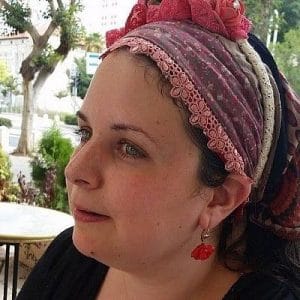
Safadi Center for International Diplomacy, Research, Public Relations and Human Rights, which is run by Mendi Safadi,a former Likud Candidate for the Knesset and a former chief of staff of former Israeli Communication Minister Ayoob Kara. Since 2012, she has been working as an Israel-based journalist and writer, covering Iran, Kurdistan, Turkey, Iraq, Syria, the Israeli-Palestinian conflict and other developments in the greater Islamic world.
Her articles have appeared in the Washington Times, the Hill, Front Page Magazine, the Daily Wire, the Christian Post, the Baltimore Jewish Times, the Jerusalem Post, Israel Hayom, Ahval and many other publications across the globe. She received her MA in Middle Eastern Studies from Ben-Gurion University. She got her BA in Government and Politics with minors in Jewish Studies and Middle Eastern Studies from the University of Maryland at College Park.
-
- .
- ..

